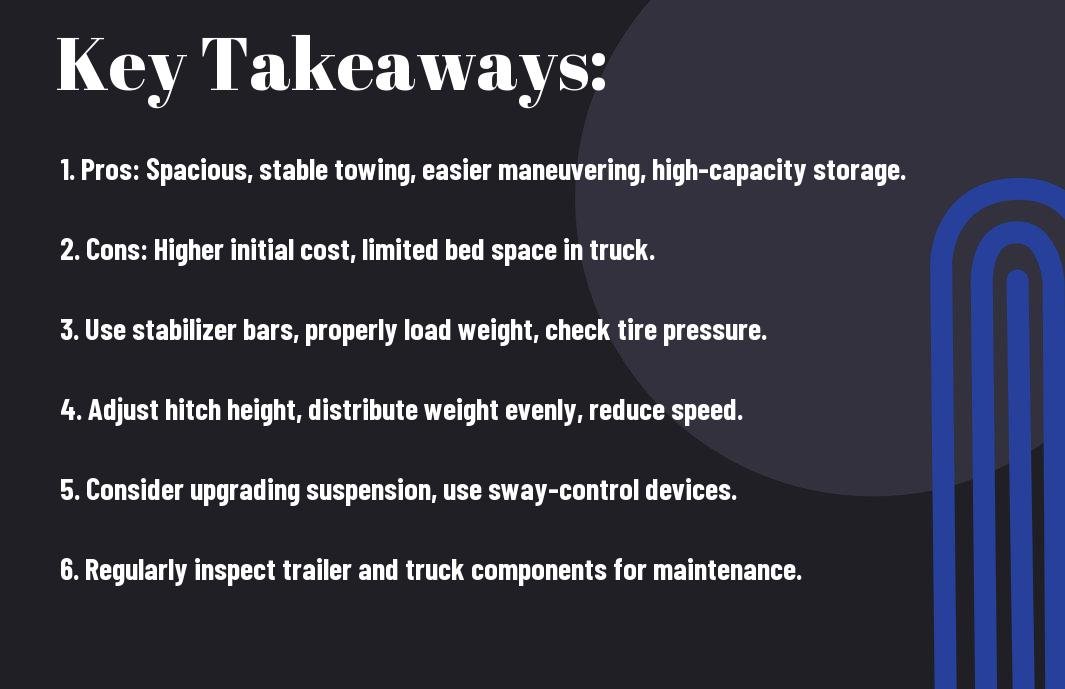Are you considering purchasing a fifth wheel camper for your next outdoor adventure? Before making a decision, it’s important to weigh the advantages and disadvantages of this type of RV. While fifth wheel campers offer spacious living areas and easy maneuverability, they also come with their own set of challenges, such as potential swaying while on the road. In this blog post, we will discuss the pros and cons of a fifth wheel camper, as well as provide you with valuable tips on how to prevent swaying and ensure a safe and comfortable travel experience. Whether you’re a seasoned RV enthusiast or a first-time buyer, this information will help you make an informed decision and enjoy your RV adventures to the fullest.
Key Takeaways:
- Pros: Spacious and comfortable, provides easier towing, more stability on the road, greater storage capacity, and better maneuverability than traditional trailers.
- Cons: Can be more expensive than other options, may require a larger and more powerful truck for towing, can be more difficult to park and navigate in tight spaces.
- Stopping Sway: Ensure proper weight distribution in the camper, use sway control devices such as sway bars or a weight distribution hitch, check tire pressure and make sure tires are in good condition, and adjust driving habits to minimize sway.

Pros of Fifth Wheel Campers
One of the biggest advantages of owning a fifth wheel camper is the spacious living quarters it offers. These campers are designed with ample interior space, making them feel more like a home away from home than a traditional travel trailer or motorhome. The layout often includes multiple slide-outs, creating expansive living areas, kitchens, and bedrooms.
Spacious Living Quarters
With the additional space provided by the slide-outs, you can enjoy more room to move around and relax during your travels. This is especially beneficial for those who plan to spend extended periods on the road, as you won’t feel cramped or confined in a fifth wheel camper. The extra space also allows for larger bathrooms and storage areas, enhancing your overall comfort and convenience.
Enhanced Towing Stability
Unlike traditional travel trailers, fifth wheel campers distribute their weight over the bed of the pickup truck. This configuration provides enhanced towing stability, making it easier to handle and maneuver your camper on the road. The unique hitch design also allows for tighter turning radiuses, giving you more control when navigating through tight spaces or backing into campsites.
Versatile Accommodations
Fifth wheel campers come in a variety of floor plans and configurations, offering versatile accommodations to suit your individual needs. Whether you’re traveling as a couple, with friends, or as a family, you can find a layout that meets your specific requirements. From bunkhouses for the kids to luxurious master suites for the adults, there’s a fifth wheel camper floor plan for everyone.
Residential Amenities
Many fifth wheel campers are equipped with residential amenities such as full-sized refrigerators, spacious kitchen islands, and entertainment centers. Some models even include features like fireplaces and washer/dryer hookups. These comforts of home can enhance your camping experience and make long-term travel more enjoyable and convenient.
Cons of Fifth Wheel Campers
After considering the pros of fifth wheel campers, it’s time to take a closer look at the potential drawbacks. While these campers offer numerous benefits, there are some drawbacks that you should be aware of before making a purchase.
Cost Considerations
When it comes to cost, fifth wheel campers can be a significant investment. Not only are you purchasing the camper itself, but you also need to consider the cost of a suitable tow vehicle. Additionally, if you don’t already own a truck capable of towing a fifth wheel, you’ll need to factor in the cost of purchasing one. While this setup can provide a comfortable and spacious living space, it’s important to carefully consider the financial commitment associated with owning and maintaining a fifth wheel camper.
Maneuverability Challenges
One aspect that may cause some concern is the maneuverability of a fifth wheel camper. Due to its design, these campers can be more challenging to maneuver than other types of recreational vehicles. You may find it more difficult to navigate tight turns, narrow roads, or parking spaces. Additionally, backing up a fifth wheel can require a bit of practice and skill. It’s essential to be aware of these challenges and take extra precautions when traveling with a fifth wheel camper.
Additional Equipment Requirements
Aside from the camper and tow vehicle, there are additional equipment requirements to consider. You may need to purchase specialized hitching systems, such as a fifth wheel hitch, and other towing accessories. This can add to the overall cost of ownership and may also require additional maintenance and upkeep. It’s important to factor in these extra requirements when considering the overall investment of a fifth wheel camper.
Licensing and Regulations
Another potential drawback of owning a fifth wheel camper is the licensing and regulations that come with it. Depending on your location and the size of the camper, you may be required to obtain a special driver’s license or adhere to specific towing regulations. It’s crucial to familiarize yourself with the laws and requirements in your area to ensure that you are legally and safely operating your fifth wheel camper.
Preventing Sway in 5th Wheel Campers
Unlike traditional travel trailers, 5th wheel campers are prone to swaying while on the road. This can be a nerve-wracking experience for any camper, but there are several techniques and tips you can utilize to minimize and prevent sway in your 5th wheel camper. Understanding the causes of sway, implementing sway control techniques, practicing driving tips, and keeping up with maintenance are all crucial in ensuring a safe and enjoyable towing experience.
Understanding the Causes of Sway
Several factors can contribute to sway in a 5th wheel camper, including crosswinds, uneven road surfaces, improper weight distribution, and sudden maneuvers. It’s important to be aware of these potential causes in order to effectively prevent and manage sway while towing your camper.
Sway Control Techniques
Implementing sway control techniques can significantly reduce the likelihood of sway occurring in your 5th wheel camper. Utilizing a sway control hitch, installing sway bars, and adjusting your driving habits can all contribute to a smoother and more stable towing experience.
Driving Tips for Sway Prevention
When towing a 5th wheel camper, there are several driving tips you can follow to minimize the potential for sway. Maintaining a steady speed, avoiding sudden maneuvers, and allowing for extra space between you and other vehicles are all effective ways to promote stability while on the road. Additionally, ensuring that your camper’s tires and suspension are in optimal condition is essential for sway prevention. Knowing how to anticipate and respond to potential sway-inducing situations is crucial for a safe towing experience.
- Keep a steady speed
- Avoid sudden maneuvers
- Give extra space to other vehicles
- Check camper tires and suspension
Maintenance Tips to Minimize Sway
Regular maintenance of your 5th wheel camper is essential for minimizing sway. Properly inflating your tires, ensuring balanced weight distribution, and keeping your camper’s axles and bearings well-maintained can all contribute to a smoother and more controlled towing experience. Perceiving and addressing any potential maintenance issues before hitting the road is key in preventing sway and ensuring your safety.
- Keep tires properly inflated
- Maintain balanced weight distribution
- Regularly inspect axles and bearings
Conclusion: Pros and Cons of Fifth Wheel Campers and How to Prevent Swaying
Considering all points, fifth wheel campers offer a spacious and comfortable living area, easy maneuverability, and the ability to tow heavy loads. However, they can be more difficult to tow and require a larger towing vehicle. To prevent swaying, you can invest in a quality weight distribution hitch, ensure proper tire pressure, and distribute weight evenly. Regular maintenance and safe driving practices also play a crucial role in preventing swaying. With these precautions in mind, you can fully enjoy the benefits of a fifth wheel camper while minimizing the drawbacks.
Fifth Wheel Camper FAQ
Q: What are the pros of a fifth wheel camper?
A: Fifth wheel campers offer a spacious and luxurious living space, with more headroom and storage space compared to traditional travel trailers. They are also easier to tow and maneuver due to their design, which distributes the weight over the truck bed, providing better stability and control.
Q: What are the cons of a fifth wheel camper?
A: Fifth wheel campers require a larger and heavier truck to tow them, which can limit potential buyers. Additionally, they are generally more expensive than travel trailers and may have limited access to certain campgrounds due to their size and turning radius.
Q: How do I stop my fifth wheel from swaying?
A: To minimize swaying, make sure your fifth wheel is properly loaded and balanced. Use weight distribution hitches and sway control devices, and ensure that your tires are properly inflated. Additionally, drive at a safe and appropriate speed and avoid sudden maneuvers.
Q: Can a fifth wheel camper be towed by any truck?
A: No, fifth wheel campers require a specific type of truck with a special hitch installed in the truck bed. This hitch allows for a more secure connection and better weight distribution, ensuring safe towing. It’s important to consult your truck’s towing capacity and match it with the weight of the fifth wheel camper before towing.
Q: How does the living space in a fifth wheel camper compare to a traditional travel trailer?
A: Fifth wheel campers generally offer a more spacious and comfortable living area compared to traditional travel trailers. The design allows for higher ceilings, larger living spaces, and more storage options. This makes them a popular choice for long-term travelers and those who prioritize comfort and luxury on the road.
